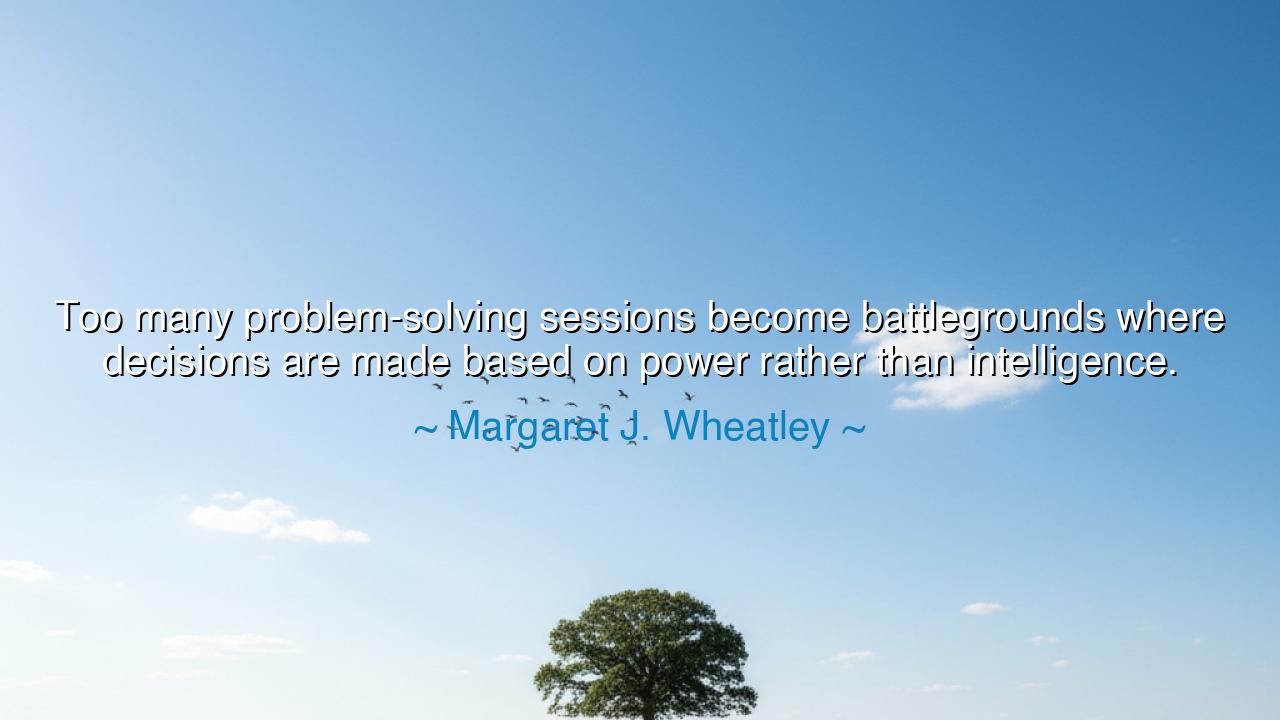
Too many problem-solving sessions become battlegrounds where
Too many problem-solving sessions become battlegrounds where decisions are made based on power rather than intelligence.






In the halls of power, where decisions are made and destinies are shaped, the ancient truth remains ever potent: wisdom must guide the hand of leadership, not force or domination. Margaret J. Wheatley’s words, “Too many problem-solving sessions become battlegrounds where decisions are made based on power rather than intelligence,” serve as a solemn reminder of the perils when intellect is overshadowed by the will to control. Her warning speaks not only to the realms of politics or business, but to every heart that seeks to navigate the labyrinth of human conflict. Too often, in the heat of decision-making, the strength of ideas gives way to the strength of individuals—or worse, to their egos.
From the dawn of civilization, leaders have struggled with this very temptation. Themistocles, the Athenian general who led the Greeks to victory at Salamis, understood that the battle was not always won by the strongest army, but by the most strategic mind. Yet, even Themistocles faced challenges when decisions were clouded by pride. How many times, in history, have great ideas been crushed beneath the weight of the strong-willed? How many times has power won the day, only to leave behind decisions that were shallow and self-serving? Wheatley’s words echo this ancient struggle, reminding us that the truest strength lies not in dominance, but in the clarity of thought and the humility of mind.
Consider the story of King Solomon, renowned for his wisdom. When two women came before him, each claiming to be the mother of a child, Solomon did not seek to impose his will through force or decree. Instead, he tested their hearts and minds, offering to split the child in two. It was through this act of intelligence—through a decision rooted in insight rather than power—that Solomon revealed the true mother. His wisdom, rather than his authority, solved the problem. In contrast, many rulers throughout history have turned to force, war, and oppression when their minds were clouded by pride, and in doing so, they created more suffering than solutions.
In the more recent story of Nelson Mandela, we see a modern echo of this wisdom. Mandela, after years of imprisonment, did not emerge with a thirst for power or vengeance. He understood that the true battle was not fought through the strength of arms, but through the strength of reconciliation and intelligent leadership. When the apartheid regime crumbled, Mandela did not seek to dominate; instead, he used his immense intellect and vision to guide South Africa toward peace. This was a victory not of power, but of intelligence, the ability to see beyond one’s own narrow interests and to think of the greater good.
Yet Wheatley’s caution is not just about great leaders; it applies to all who seek to solve the challenges of the day. In every home, in every workplace, in every community, there is a temptation to let decisions be governed by power dynamics rather than intelligence. How many family feuds have been fought not with reason, but with force of will? How many arguments in the workplace have been settled not by the best idea, but by the loudest voice or the most powerful position? Wheatley calls us to examine this: Is our problem-solving guided by wisdom, or by the need to dominate?
The lesson is simple, yet profound: intelligence and wisdom must be our guiding lights in any decision-making process. When we face challenges, we must remember that force is often the enemy of progress. We must seek to solve problems through dialogue, through humility, and through the clear-headed pursuit of what is best, not just for ourselves, but for all involved. As Plato taught, the philosopher-king is the ruler who governs not through force, but through insight and virtue.
In your own life, whether in small matters or grand, remember this: do not allow your decisions to be ruled by ego, dominance, or pride. Recognize the wisdom of those who came before you—the Solomons, the Mandelas, the thinkers and doers who shaped the world with their clarity of mind. Seek solutions through thought, not force. Let intelligence be your weapon, and let it guide you through the chaos of life. In the end, it is not power that creates lasting solutions, but the clarity of intelligence—the quiet strength that knows when to listen, when to speak, and when to act.






AAdministratorAdministrator
Welcome, honored guests. Please leave a comment, we will respond soon